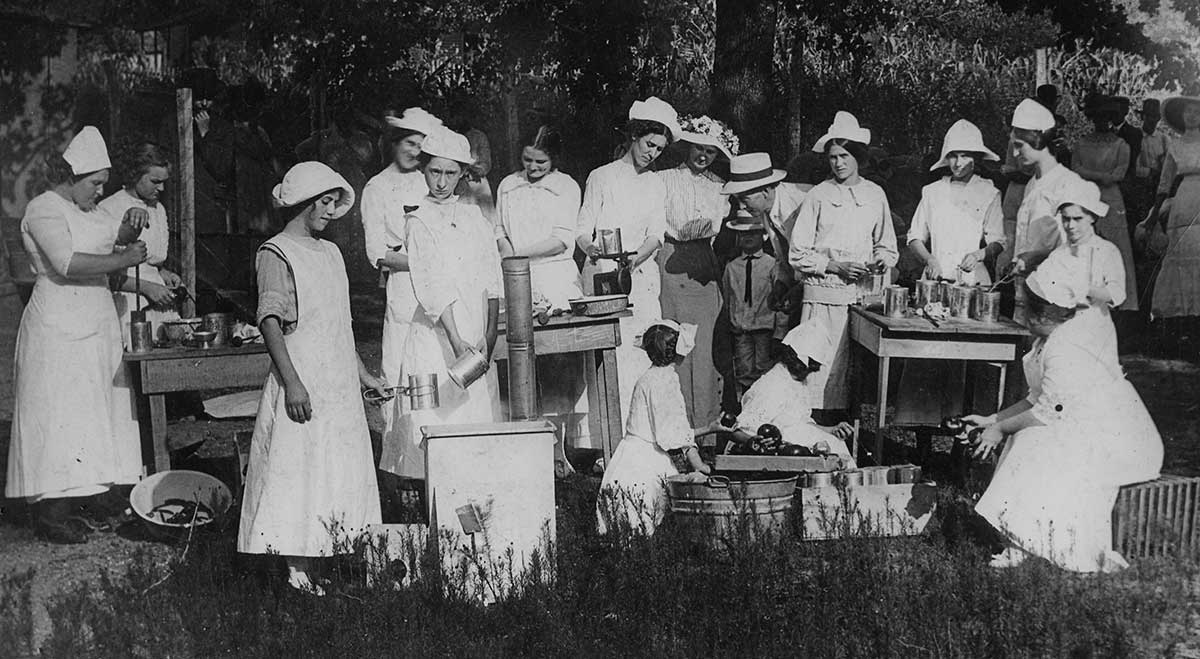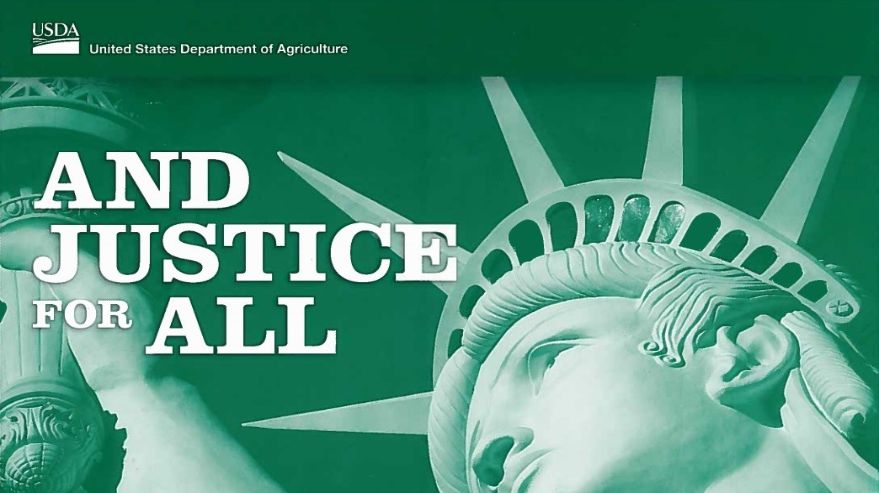Cooperative Extension provides non-formal education and learning opportunities to youth and adults throughout the United States — to farmers and families of rural communities as well as people living in suburban and urban areas. Most universities engage in research and teaching, but the nation’s more than 100 land-grant colleges and universities have a third, critical mission — outreach and extension.
As Rhode Island’s land-grant institution, the University of Rhode Island, through Cooperative Extension, brings vital, practical information to agricultural producers, small business owners, communities, consumers, families, and young people. We pride ourselves on our role in translating science for practical application and are always looking to identify emerging research questions. We share those questions with researchers to find answers and encourage application of science and technology to improve agricultural, environmental, economic, and social conditions.
Leadership Message

The University of Rhode Island Cooperative Extension is dedicated to delivering science-based information and learning opportunities to people throughout Rhode Island — from Providence to Westerly. Extension is an integral partner, ensuring that community needs, and challenges are communicated with researchers and applying knowledge gained through research and education in an impactful way with local communities. We work with individuals, communities, and industry, providing access to face-to-face and online education. In Rhode Island, Cooperative Extension staff and faculty focus on the most critical issues to our state, and we leverage the efforts of dedicated volunteers to develop youth into successful, contributing adults; improve water quality; reduce food waste and hunger; and to beautify the state through sustainable gardening.
History

In 1904, President Butterfield and A.E. Stene (then Superintendent of College Extension) organized an extension department at the Rhode Island College of Agriculture and Mechanic Arts. This department advocated the application of research-based knowledge in resolving problems within human communities. The department eventually evolved into the present-day URI Cooperative Extension and was a forerunner of the national extension system, which was formed with the passage of the Smith-Lever Act in 1914 creating the Cooperative Extension System at USDA.
The Rhode Island 4-H Program has been active since the early 1920’s teaching Rhode Island youth life skills and how to be productive citizens continually learning and leading the way.
By 1928, researchers begin helping the fruit industry by purchasing twenty acres of nearby farmland, now known as URI East Farm, where fruit trees were planted and the research followed. In addition to fruit research, East Farm was also at the center of poultry research. After World War II, an additional 20-acres was purchased to grow the farm to its present-day size. Learn more about East Farm’s unique history by visiting: uri.edu/research/east-farm .
Today, URI Cooperative Extension is part of the national Extension System, in partnership with the National Institute of Food and Agriculture (NIFA) within the U.S. Department of Agriculture (USDA). We are part of more than 100 land-grant universities and more than 3,000 county offices across the nation. Cooperative Extension combines the expertise and resources of federal, state, and local governments and is designed to meet the need for research, knowledge and educational programs.
– Lisa Townson, Associate Dean, Extension and Agricultural Programs
Civil Rights

The University of Rhode Island Cooperative Extension is committed to equal access and opportunity, and to ensuring all reasonable effort is made to deliver and to provide access to Extension programs and services for all individuals. URI Cooperative Extension strives to ensure that all educational programs, services, activities, and materials we offer to the public are identified, developed, delivered, and evaluated, without regard to protected status.
URI Cooperative Extension strives to fight for equal distribution of resources and opportunities to ensure equitable access to science among all cultures and backgrounds, regardless of race, color, or socioeconomic status. We will continue to work for change and cultivate an environment that upholds the values of equal opportunity for all.
Please review the information in our RI Cooperative Extension Civil Rights Compliance Handbook for additional details about our efforts.
All Extension participants and members of the university community may raise concerns of discrimination, harassment, and retaliation with the URI Office of Equal Opportunity:
https://web.uri.edu/equal-opportunity/discrimination/
How to File a Complaint of Discrimination
To learn more about filing a complaint of discrimination, harassment, or retaliation at the University of Rhode Island, visit:
https://web.uri.edu/equal-opportunity/discrimination/
In accordance with Federal civil rights law and U.S. Department of Agriculture (USDA) civil rights regulations and policies, the USDA, its Agencies, offices, and employees, and institutions participating in or administering USDA programs are prohibited from discriminating based on race, color, national origin, religion, sex, disability, age, marital status, family/parental status, income derived from a public assistance program, political beliefs, or reprisal or retaliation for prior civil rights activity, in any program or activity conducted or funded by USDA (not all bases apply to all programs). Remedies and complaint filing deadlines vary by program or incident.
Persons with disabilities who require alternative means of communication for program information (e.g., Braille, large print, audiotape, American Sign Language, etc.) should contact the Cooperative Extension, as shown below.
To file a program discrimination complaint, complete the USDA Program Discrimination Complaint Form, AD-3027, found online at How to File a Program Discrimination Complaint and at any USDA office, or write a letter addressed to USDA and include all information requested in the form. To request a copy, call (866) 632-9992. Submit your completed form or letter to USDA by:
- Mail: U.S. Department of Agriculture, Office of the Assistant Secretary for Civil Rights, 1400 Independence Avenue, SW, Mail Stop 9410, Washington, D.C. 20250-9410
- Fax: (202) 690-7442
- Email: program.intake@usda.gov
USDA is an equal opportunity provider, employer, and lender.
Requesting a Reasonable Accommodation or Language Assistive Services
The University of Rhode Island (URI) encourages all people to participate in its programs and activities. If you anticipate needing any type of accommodation to participate in a program, service, or activity offered by the Cooperative Extension, or to request language assistive services, please contact the appropriate individual below:
- Land Stewardship / Master Gardener
Kate Hardesty, Program Administrator, Extension Educator
Phone: (401) 874-4096
Email: keventurini@uri.edu - Water Resources
Alissa Cox, Clinical Assistant Professor, Director – New England Onsite Wastewater Training Program
Phone: (401) 874-5707
Email: alibba@uri.edu - Energy Literacy
Kate Hardesty, Program Administrator, Extension Educator
Phone: (401) 874-4096
Email: keventurini@uri.edu - Food Systems and Agriculture
Lisa Tewksbury, Research Associate, Biological Control Lab
Phone: (401) 874-2750
Email: lisat@uri.edu - Healthy Lifestyles (Nutrition)
Ruthann Marchetti, Manager, EFNEP
Phone: (401) 277-5272
Email: ruthann.marchetti@uri.edu - 4-H
Kristy Horan, State 4-H Leader
Phone: (401) 874-2959
Email: kstone@uri.edu
Contact must be made at least five (5) business days in advance of the date of required services or anticipated participation. Reasonable efforts will be made to accommodate individuals who miss this deadline. For TTY assistance, contact R.I. Relay Services at 711.
IMPORTANT NOTE:
FOR ALL PRESENTATIONS GIVEN ON BEHALF OF URI COOPERATIVE EXTENSION, PLEASE ALWAYS INCLUDE
THIS SLIDE
AS THE FINAL ONE IN YOUR SLIDE DECK.
Promoting Access for All
The University of Rhode Island Cooperative Extension is committed to equal access and opportunity, and to ensuring all reasonable effort is made to deliver and to provide access to Extension programs and services for all individuals. URI Cooperative Extension strives to ensure that all educational programs, services, activities, and materials we offer to the public are identified, developed, delivered, and evaluated, without regard to protected status. The Civil Rights tab includes additional information for individuals interested in learning how to file a discrimination, harassment, or retaliation complaint, or for those seeking language assistive services or who wish to learn more about submitting a reasonable accommodation request to participate in a Cooperative Extension service, program, or activity.
